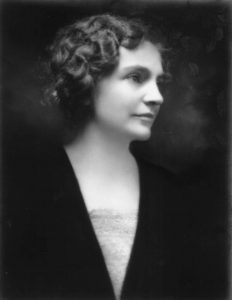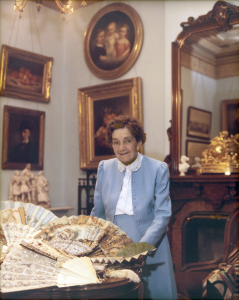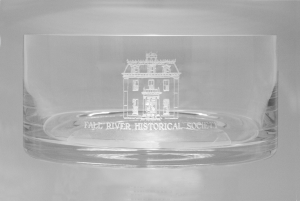Florence Cook Brigham Award
Established in honor of the Fall River Historical Society’s beloved third curator and noted Fall River historian, Florence Cook Brigham (1899-2000), this award was originally developed in 2002 for presentation to Earle P. “Chuck” Charlton II (1926-2015), a long-time member of the organization and one of the Society’s leading benefactors.
Reinstated in 2016, it is now presented annually to two worthy individuals who are members of the FRHS. Nominees are chosen based on significant contributions to either the Fall River Historical Society or the greater Fall River community through (or in areas of) historic preservation, the arts, published works, and/or volunteerism.
Candidates are nominated by the organization’s members, and are selected by a committee comprised of FRHS directors and members. Recipients are recognized at an Awards Ceremony and Dinner held in their honor.
About Florence Cook Brigham (1899-2000)
 Florence Cook Brigham was born in Fall River, Massachusetts, on December 31, 1899, the daughter of Benjamin Cook (1870-1962), a successful attorney and, later, jurist, and the Brooklyn, New York, born Hattie May Clark (1873-1963), a minister’s daughter. During her long life, she bore witness to her native city’s rapidly changing fortunes, and experienced, first hand, the major events in Fall River’s twentieth-century history. In her later life, those observations would serve her well; she knew Fall River history, because she had lived it.
Florence Cook Brigham was born in Fall River, Massachusetts, on December 31, 1899, the daughter of Benjamin Cook (1870-1962), a successful attorney and, later, jurist, and the Brooklyn, New York, born Hattie May Clark (1873-1963), a minister’s daughter. During her long life, she bore witness to her native city’s rapidly changing fortunes, and experienced, first hand, the major events in Fall River’s twentieth-century history. In her later life, those observations would serve her well; she knew Fall River history, because she had lived it.
An astute, inquisitive child with a keen memory, she was reared by loving parents in the late Victorian manner with a strong sense of duty and responsibility to family, church, and community. “I had a lovely childhood,” she later stated, writing, “I can remember my mother … saying that my father had only one extravagance and that was his three daughters.” But the Cook girls, at times, must have been a handful: “We must have been very hard to take care of, since we went through fifteen nursemaids” before finding “our sixteenth,” who stayed.
Educated in the public schools of her native city, she graduated from B.M.C. Durfee High School with the class of 1917; the narrative printed below her photograph in The Durfee Record emphasized qualities that would be a mainstay throughout her long life:
“A quiet, studious girl [with] a host of friends … the delight of her teachers. Good nature is one of her characteristics and she may often be seen generously devoting [time] to [those] who desire help.”
Following high school, she entered Mount Holyoke College, where she majored in German, with a minor in Romance languages, later recalling, “German was not very popular in those days.” Graduating in 1921, she returned to her parents’ Hood Street residence and secured employment for one year teaching German as a substitute at Durfee High School, a situation she described as “not very successful … discipline was my problem.” She willingly turned her salary over to her parents: “We were never told that we should, but … wanted to work a year to show our appreciation” for providing her with an education. In 1922, she married fellow Fall Riverite Richard Curtis Brigham (1895-1974); they were the parents of three children.
In the traditional mode of her contemporaries during that last halcyon decade of Fall River’s prosperity, her expected role upon marriage was that of homemaker, mother, and clubwoman, a path her life followed until, as she aptly put it, “the Depression took hold.” Without hesitation, Florence entered the workforce, recalling, “most everyone from Fall River was feeling the pinch.”
She sold girls’ clothing door-to-door, from a “company in Davenport, Iowa, with darling dresses that were very reasonable – some for two dollars.” In the summer months, she took boarders, oftentimes the children of friends, at the Brigham family cottage in Craigville, Massachusetts, “for $1.00 per day,” and, despite knowing “nothing about running a counter,” she industriously managed a lunch counter on the beach for The Christian Camp Meeting. The latter “turned out better than expected.”
In 1940, she accepted an offer to “run that year’s Christmas Seal Campaign” for the Anti-Tuberculosis Society. The sale was extremely successful and, “when it was decided to open an office year-round,” she “took over, part-time.” Her days selling girls’ clothing were behind her, a situation, she later wrote, “which didn’t break my heart one bit.”
During World War II, “the Luther Mill had been called into service,” and Mrs. Brigham was asked to go into the office part-time as a payroll clerk: “I knew nothing about payrolls … could I read charts … I should hope I could. I went in and worked both jobs.”
In 1967, she retired, briefly. That same year, she “was asked if she was interested in working at the Historical Society,” because the curator, Mrs. Mary B. Gifford, “needed help part time.” At the age of sixty-seven, Florence Brigham found her calling, and, as assistant curator, embarked upon a new vocation. She was appointed curator in 1976, following her predecessor’s death. By her own admission, “My days at the Fall River Historical Society were the happiest of all my working career.”
Years before, in the mid-1920s, she had been entertained by Miss Elizabeth Hitchcock Brayton (1865-1935) in her Rock Street mansion, which, in 1935, was bequeathed to the Fall River Historical Society; once a guest, she would later preside as curator. Decades later, when asked if she remembered anything about the building as a private home, she stated that she didn’t, and was “Sorry that I wasn’t more observant.” A young woman at the time, to her, “It probably just looked like any other rich old lady’s house.”
During her long tenure at the FRHS, she became recognized as a noted expert on the history of her native city; in demand as a lecturer, she rarely turned down bookings, and more than once presented two lectures to different organizations back-to-back on the same evening. Decades before, her mother-in-law, in reference to one becoming too involved in charity work, cautioned, “Florence, learn to say no.” Not wanting to disappoint, she rarely took heed.
 She was a decidedly reluctant authority on the story of Fall River’s most infamous resident, Lizzie Andrew Borden (1860-1927), feigning interest in a topic she often discussed by virtue of her position, but one she privately loathed. An oft-repeated remark about the public’s growing fascination with the subject: “I don’t understand it.” In 1992, during the Centennial of the Borden Murders, crowds of visitors descended upon Fall River and the Historical Society, en masse. After a particularly grueling day guiding tours and answering innumerable questions, a tired and exasperated Mrs. Brigham queried: “My heavens. Where did all these people come from?”
She was a decidedly reluctant authority on the story of Fall River’s most infamous resident, Lizzie Andrew Borden (1860-1927), feigning interest in a topic she often discussed by virtue of her position, but one she privately loathed. An oft-repeated remark about the public’s growing fascination with the subject: “I don’t understand it.” In 1992, during the Centennial of the Borden Murders, crowds of visitors descended upon Fall River and the Historical Society, en masse. After a particularly grueling day guiding tours and answering innumerable questions, a tired and exasperated Mrs. Brigham queried: “My heavens. Where did all these people come from?”
In her role as Fall River’s leading historian, she was interviewed for, or quoted in, countless books and periodicals, and appeared, albeit very unenthusiastically, in television news programs and feature documentaries on a variety of topics.
The first to praise one for a job well done, she shunned any form of personal recognition, and was the reluctant recipient of several awards during her lifetime. In 1993, she summed up her vast knowledge of Fall River history in classic fashion, familiar to anyone who knew her: “Perhaps I have the advantage of having lived in Fall River all my life and … can remember it. As I say, if you live ninety plus years and haven’t learned something, you must be rather stupid.”
[maxbutton id="4" url="https://fallriverhistorical.org/florence-cook-brigham-award/tribute-to-florence-cook-brigham/" text="A Tribute to Florence Cook Brigham" ]
Recipients
2019
2018
2017
2016

